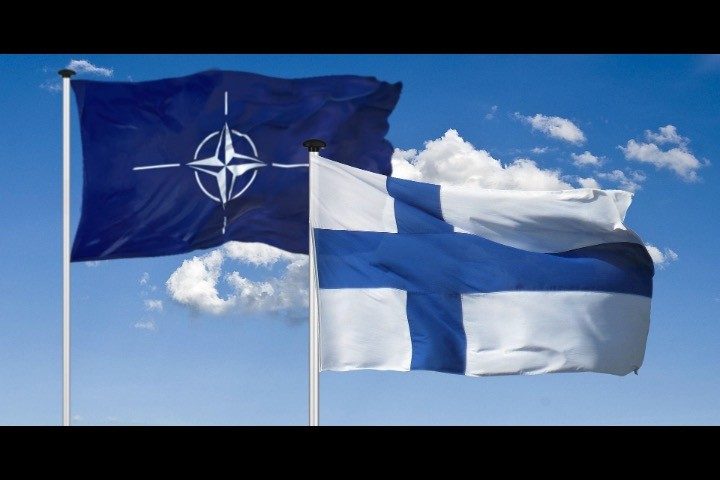
SINGAPORE — On Tuesday, April 4, Finland joined the U.S.-led North Atlantic Treaty Organization (NATO) military bloc, ending decades of nonalignment. Following Finland’s membership in the alliance, NATO, the world’s largest and most powerful military group — a symbol of American hegemony and shared deterrence among Western nations — expanded its border by around 1,300 kilometers of land and water.
The Nordic country formalized its accession when Finnish Foreign Minister Pekka Haavisto handed an official document to U.S. Secretary of State Antony Blinken at the NATO headquarters in Brussels on Tuesday. In announcing the move, Blinken said:
I’m tempted to say this is may be the one thing that we can thank Mr Putin for.
He once again precipitated something he claims to want to prevent by Russia’s aggression, causing many countries to believe that they have to do more to look out for their own defense and to make sure that they can deter possible Russian aggression going forward.
“At times like this, friends and allies are more important than ever,” said NATO Secretary-General Jens Stoltenberg at a joint press conference with Finnish President Sauli Niinistö, “and Finland now has the strongest friends and allies in the world.”
On Monday, Stoltenberg had declared that Finland’s flag would be raised outside the NATO headquarters on the day of Finland’s accession.
“Tomorrow, we will welcome Finland as the 31st member,” Stoltenberg informed reporters a day before a gathering of NATO foreign ministers in Brussels. “Not so many years ago we thought it was unthinkable that Finland would become a member. Now they will be a fully-fledged member of our alliance and that is truly historic. We are removing the room for miscalculation in Moscow about NATO’s readiness to protect Finland, and that makes Finland safer.”
Echoing Stoltenberg’s remarks, before Finland’s blue-and-white flag was hoisted in front of NATO’s headquarters, Finnish Defense Minister Antti Kaikkonen labeled his country’s NATO ascendency as a “a win-win situation.”
By joining NATO, Finland will be under the bloc’s Article Five, the collective-defense pledge that an attack on one member “shall be considered an attack against them all.”
Following Russian President Vladimir Putin’s military operations in Ukraine in 2022, NATO’s Article Five collective-security guarantee prompted Finnish leaders to drop the country’s nonalignment position and apply for NATO membership. “President Putin went to war against Ukraine with a clear aim to get less NATO,” said Stoltenberg. “He’s getting the exact opposite.”
Although Finland’s NATO bid endured resistance from Turkey and Hungary for months, Hungary approved Finland’s application on March 27, and the Turkish Parliament voted in favor of the Nordic country’s accession last week. Finland’s approval to join NATO in less than a year makes its application the fastest membership process in the bloc’s recent history.
Becoming a member of NATO means that Finland’s security will be closely associated with the West’s. Furthermore, by joining NATO the country has effectively abandoned its stance of military neutrality and path of “Finlandization.”
For years, Finnish neutrality had been deemed as one of the most entrenched elements of the country’s identity, so its NATO ascendancy marks a shift in its policy and heralds a new epoch for both Finland and Europe.
The Nordic country has much to offer NATO in terms of military enhancements. After all, Finland has been one of the few European countries to maintain a conscription army notwithstanding its nonalignment stance and years of peace after the Second World War.
Annually, Finland drills around 21,000 new conscripts, with terms of service varying from 180 to 362 days. Since 1994, women have been able to serve voluntarily in the Finnish military before becoming part of the military’s reserve corps of 280,000 soldiers.
Should the country face military threats, almost 900,000 Finns aged between 17 and 60 would be service-ready, out of a population of around 5.5 million.
Occasionally alluded to as “Western Europe’s strongest artillery,” the Finnish army boasts 48 self-propelled 155 mm howitzers and 72 122-mm ones, 740 towed artillery units (including almost 500 Soviet-made 122 H63s), over 1,600 mortars, and 27 helicopters (20 of which are NH90s).
According to the Global Firepower Index, Finland’s military presently ranks as the 51st most powerful in the world. Nonetheless, given its huge focus on artillery (with more pieces than Germany and France combined), Finland’s combat capabilities are certainly formidable.
With a yearly military budget of around $6 billion, Finland already spends more than two percent of its GDP on defense, thus attaining NATO’s expenditure criterion for member states established in 2014.
However, both ordinary Finns and political parties remain divided on the issue of permanent allied bases in their country due to Finland’s successful NATO bid. Analysts have thus contended that smaller temporary deployments akin to NATO’s Enhanced Forward Presence mobilized in the Baltics might alleviate domestic concerns about long-term military bases.
In response to Finland’s NATO accession, Russia claimed that it would employ measures to boost its military presence in the west and northwest of the country.
“We will strengthen our military capabilities in the west and north-west,” Deputy Foreign Minister Alexander Grushko declared, according to Russia’s state-backed news agency RIA. “In the event of the stationing of armed forces and weapons of other NATO members on the territory of Finland, we will take additional steps to reliably ensure Russia’s military security.”
Russia’s Foreign Ministry also stated that NATO’s expansion was a landmark mistake that would raise the risk of conflict in the region, weaken its global influence, and undermine its relations with Moscow.
Russian Defense Minister Sergei Shoigu told the Russian military’s top echelons that Finland’s accession has sparked risks of a “significant expansion of conflict,” yet assured his audience that Finland’s NATO status would have no bearing on the aftermath of Russian actions in conflict-ridden Ukraine.
Last year, Shoigu revealed that Russia was taking “adequate countermeasures” and would set up 12 units and divisions in its western military district.
NATO’s further expansion is an “encroachment on our security and on Russia’s national interests,” Kremlin spokesman Dmitry Peskov lambasted.
On the day of Finland’s accession, Stoltenberg said that Sweden met the same criteria for NATO membership as Finland, so there should not be any difficulties in joining the bloc. He promised to work to get Sweden into NATO as soon as possible, pointing out that NATO and Swedish officials were already collaborating more closely even as they await a finalized decision.
Nevertheless, Turkey continues to delay Sweden’s NATO application. Ankara explained that since members of what it regards as terrorist groups reside in Stockholm — a charge Sweden dismisses — Sweden would have to extradite these so-called terrorist groups before Ankara could ratify its NATO bid.
In addition, Turkish grievances with the West have been many, with Turkey claiming that Brussels has treated it poorly by enticing the country with the prospect of European Union (EU) membership for over three decades, but dismissing its bid for EU membership on the pretext of not meeting “membership criteria.” In contrast, several less-developed countries in Eastern Europe have been permitted to join the EU. Even Ukraine, a country beleaguered by corruption, poverty, and neo-Nazi elements, has been considered for EU membership.
NATO’s involvement in the 2016 coup attempt in Turkey has been another thorn in the flesh for Turkey-NATO relations, as some have blamed NATO for being directly responsible for the plot. The Turkish government’s removal of NATO staff following the attempted coup hints that Ankara suspects them as well.
Sweden has to employ additional measures for NATO membership, as the present ones are insufficient, Turkish Foreign Minister Mevlüt Çavuşoğlu said on Wednesday. “At a meeting with my Swedish counterpart [Tobias Billström] in Brussels, we raised the topic of the steps that Stockholm needs to take in the process of joining NATO. Some steps have been taken, but they are insufficient. Additional steps are needed,” Çavuşoğlu said at a press conference in Brussels.
Meanwhile, the Turkish newspaper Aydınlık has indicated doubts about NATO’s benefits to Turkey, calling into question Turkey-NATO relations.
“Although NATO’s enlargement has been seen as a policy of containing Russia, it is now obvious that Turkey is being similarly besieged. In the past, the Atlantic [powers] attempted to establish global hegemony by hemming the Eurasian continent in on land, in accordance with Spykman’s Rimland theory, therefore including countries such as Turkey, Iran, Afghanistan and China in its geopolitical axis,” the newspaper penned in an analysis:
Among the trusted countries, Iran escaped America’s control in 1979, China after 1990, Turkey on July 15, 2016 [the day of the attempted coup against current president Recep Tayyip Erdoğan…] and Afghanistan in 2021, becoming target countries. Therefore, the geopolitical axis was broken, and shifted to Greece, southern Cyprus and Israel. Thus, Turkey was cut off from the Atlantic [axis], and pushed toward the Heartland, and is now besieged from Alexandropoulos to Crete, and from there to the eastern Mediterranean and northern Syria.
Aydınlık’s analysis echoes increasing anti-NATO and anti-Western sentiment in Turkey. A 2019 poll indicated that only 21 percent of Turks had a positive view of the alliance. Two years later, another survey revealed that a considerable 90.3 percent did not think that NATO would help the country in an emergency. Remarkably, 51.7 percent of respondents said that NATO “exploits” Turkey for its own interests, and a 2022 poll divulged that 39.4 percent of Turks would rather Turkey “give priority to Russia and China” in foreign policy, as opposed to 37.5 percent for the EU and the United States.
Recently, Ankara slammed the United States for interfering in its internal affairs after U.S. Ambassador Jeff Flake met with Kemal Kılıçdaroğlu, Erdoğan’s main rival.
“Joe Biden’s ambassador visits Kemal. Shame on you, think with your head. You are an ambassador. Your interlocutor here is the president. How will you stand up after that and ask for a rendezvous with the president? Our doors are closed to him, he can no longer come in. Why? He needs to know his place,” Erdoğan decried.
Also delaying Sweden’s admission into NATO is Hungary, although NATO diplomats opine that Budapest will authorize Sweden’s bid if Turkey does so.
Notably, the Swedish government declared on April 1 that it would participate in the European Commission’s ongoing lawsuit against Hungary at the European Court of Justice, despite Sweden’s NATO bid hinging on its complaints about Hungary. The lawsuit contests Hungary’s Child Protection Act on the pretext that it discriminates against LGBTQ+ people, as it bans the promotion of homosexuality or gender transition in Hungarian schools and media.
Previously, Sweden was among the most outspoken opponents of the Hungarian government’s view towards LGBTQ+ people, and Budapest is now seeking assurances from the Nordic nation that it would cease such criticism from now on. Having said that, Sweden is currently apparently bent on siding with the European Commission, whether or not Hungary approves its NATO bid.



